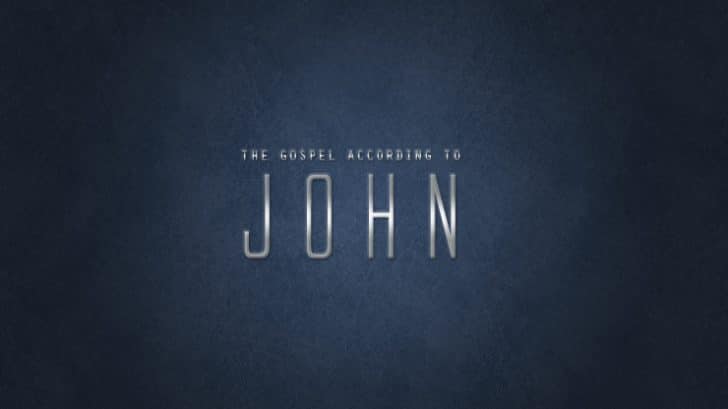John 6:1-15 | Bread And The Five Thousand
6 After this Jesus went away to the other side of the Sea of Galilee, which is the Sea of Tiberias. 2 And a large crowd was following him, because they saw the signs that he was doing on the sick. 3 Jesus went up on the mountain, and there he sat down with his disciples. 4 Now the Passover, the feast of the Jews, was at hand. 5 Lifting up his eyes, then, and seeing that a large crowd was coming toward him, Jesus said to Philip, “Where are we to buy bread, so that these people may eat?” 6 He said this to test him, for he himself knew what he would do. 7 Philip answered him, “Two hundred denarii worth of bread would not be enough for each of them to get a little.” 8 One of his disciples, Andrew, Simon Peter’s brother, said to him, 9 “There is a boy here who has five barley loaves and two fish, but what are they for so many?” 10 Jesus said, “Have the people sit down.” Now there was much grass in the place. So the men sat down, about five thousand in number.11 Jesus then took the loaves, and when he had given thanks, he distributed them to those who were seated. So also the fish, as much as they wanted. 12 And when they had eaten their fill, he told his disciples, “Gather up the leftover fragments, that nothing may be lost.”13 So they gathered them up and filled twelve baskets with fragments from the five barley loaves left by those who had eaten. 14 When the people saw the sign that he had done, they said, “This is indeed the Prophet who is to come into the world!”
15 Perceiving then that they were about to come and take him by force to make him king, Jesus withdrew again to the mountain by himself. (John 6:1-15)
Feeding five thousand
The fourth miracle:
The feeding of the five thousand is the fourth miracle of Jesus recorded by John. The first was turning water into wine at the wedding in Cana. The second was healing the official’s son. And the third miracle was the healing of the man who had been lame for thirty-eight years. This is the fourth recorded miracle. Jesus did many more miracles than these. According to John 20:30-31, Jesus did many other signs in the presence of the disciples, which are not written in this book; but these are written so that you may believe that Jesus is the Christ, the Son of God, and that by believing you may have life in his name.
This is a creative miracle. Some of Jesus’ miracles are restorative miracles. He restores health, he restores sight etc.. He also preformed transformative miracles like transforming water into wine. But this was a creative miracle. It attest to his eternal and creative power outlined in the first chapter of John. John explains: In the beginning was the Word, and the Word was with God, and the Word was God. He was in the beginning with God. All things were made through him, and without him was not any thing made that was made. In him was life… (John 1:1-4) This Jesus did not become alive, he is life and in him was life. He has power to create something from noting. John wants us to see this about Jesus. He doesn’t want us to mistake his deity, power and preeminence. Why? So that you may believe that Jesus is the Christ, the Son of God, and that by believing you may have life in his name. (John 20:31)
The setting:
Jesus had just finished a conversation with some Jewish unbelievers that were indignant that he had performed a miracle on the Sabbath (John 5:15). The situation was even more heated because Jesus had instructed the healed man to break the Sabbath by carrying his bed-roll. They became more disturbed, even seeking to kill him, when Jesus made himself to be equal with God (John 5:18). Jesus pleaded with them for their salvation. He explained that if they searched the scriptures to find eternal life they should believe in him because the scriptures speak of Jesus.
After this Jesus went away to the other side of the Sea of Galilee, which is the Sea of Tiberias. (John 6:1)
The contemporaries of Jesus attested to his miracles
In modern times, people have attempted to explain away the miracles preformed by Jesus. I’ve heard theories that this particular miracle was a “spiritual” miracle and not a physical miracle. Some say that a simple act of sharing preformed by a young boy became contagious generosity that spread through the crowd. Everyone was sharing their food and there was enough leftover to fill twelve baskets. Sounds nice, doesn’t it? Their theory says that Jesus never preformed a physical miracle. My question is, why was the crowd there in the first place? Verse 2: And a large crowd was following him, because they saw the signs that he was doing on the sick (John 6:2). In reality, the contemporaries of Jesus never argued with whether or not Jesus preformed miracles. They questioned the source of his power, but no one questioned the fact of his miracles. Even Nicodemus said, “we know that you are a teacher come from God, for no one can do these signs that you do unless God is with him.” (John 3:2) Modern day critics would be wise to consider the fact that the contemporaries of Jesus attested to his miracles, not against them.
Jesus is always intentional in his process of making disciples
At times I’ve questioned why Jesus does things they way he does. I don’t always understand his process. I want to, but I don’t always get it. One thing for sure is that Jesus does have a process. He’s never haphazard about anything he does. He’s very strategic and purposeful. We may not always understand his strategy or get his purpose, but we can’t deny his intentionality. I this story I want to outline two ways Jesus was intentional in his process of making disciples.
First, Jesus was intentional to spend moments/time with his disciples. Jesus went up on the mountain, and there he sat down with his disciples. (John 6:3) It almost seems as though he was just chilling out on the mountain with his friends. Even though there was a crowd on it’s way, Jesus, in this moment was just spending time with his buddies. Whom has God entrusted to you? What people has God placed in your life to mentor and disciple? Your wife? Your kids? Any friends or siblings? Do you make intentional time to spend with them?
Second, Jesus was intentional and strategic about present circumstances. Look at verse 4: Now the Passover, the feast of the Jews, was at hand. (John 6:4). The Passover was also called the feast of unleavened bread. It wasn’t a coincident that Jesus was getting ready to perform a miracle involving bread just days before the greatest and most historical holiday celebrated by the Jewish people. It’s easy to only see the compassionate Jesus who happened to see a crowd of hungry people and feed them. I don’t want to minimize the compassionate nature of our Lord. However, I don’t want us to get so focused on feeding the people that we miss the bread. The Passover was a celebration that marked the reality that the first born of the Israelites were spared from death because they were marked by the blood of the lamb. However, death was imminent for the first born of the Egyptians. This memorial celebration’s central feature was unleavened bread. Jesus is the fulfillment of this celebration in both the lamb and the bread. We can’t miss this.
The Passover was at hand…
Lifting up his eyes, then, and seeing that a large crowd was coming toward him, Jesus said to Philip, “Where are we to buy bread, so that these people may eat?” He said this to test him, for he himself knew what he would do. (John 6:5-6)
Jesus, understanding the circumstances at hand, knew what he was going to do. He had a plan. He was intentional to take advantage of the situation. Seize every moment. Take advantage the situation at hand to teach the gospel. Ephesians 5:15-16 says it like this: Look carefully then how you walk, not as unwise but as wise, making the best use of the time, because the days are evil.
The miracle:
7 Philip answered him, “Two hundred denarii worth of bread would not be enough for each of them to get a little.” 8 One of his disciples, Andrew, Simon Peter’s brother, said to him, 9 “There is a boy here who has five barley loaves and two fish, but what are they for so many?” 10 Jesus said, “Have the people sit down.” Now there was much grass in the place. So the men sat down, about five thousand in number.11 Jesus then took the loaves, and when he had given thanks, he distributed them to those who were seated. So also the fish, as much as they wanted. 12 And when they had eaten their fill, he told his disciples, “Gather up the leftover fragments, that nothing may be lost.” 13 So they gathered them up and filled twelve baskets with fragments from the five barley loaves left by those who had eaten. (John 6:7-13)
Closing thoughts:
What would you be thinking if you had just witnessed this event? How would you digest this miracle? What would you have thought about Jesus? Here’s what the people who were present thought: When the people saw the sign that he had done, they said, “This is indeed the Prophet who is to come into the world! (John 6:14) At first glance it seems like they get it. After all, Moses said in Deuteronomy 15: 15, “The Lord your God will raise up for you a prophet like me from among you, from your brothers—it is to him you shall listen.” This is undoubtedly a prophecy about Jesus. They’ve discovered the prophet who is to come into the world! Wouldn’t Jesus be excited that these people have discovered him? Look how Jesus responds in verse 15. Perceiving then that they were about to come and take him by force to make him king, Jesus withdrew again to the mountain by himself. (John 6:15)
They found the prophet and king foretold by Moses and the prophets, but they made him into a king by their own fleshly terms. They found Jesus, but not the right one. In John 18:36 Jesus explains his kingdom to Pilot. Jesus answered, “My kingdom is not of this world. If my kingdom were of this world, my servants would have been fighting, that I might not be delivered over to the Jews. But my kingdom is not from the world.” They found an earthly king; they found a welfare lord. They were seeking a prosperity gospel and missed the bread of life. Jesus is better than all of that. Jesus came into this world not to give you bread, but to be our bread.
John 6:51 “I am the living bread that came down from heaven. If anyone eats of this bread, he will live forever. And the bread that I will give for the life of the world is my flesh.”

